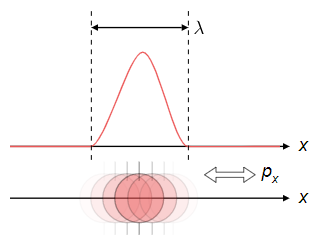Quantum Principles

Quantum physics is a big topic. Even today, scientists are coming out with new research in this field. Besides the ones you've learned about already, here are some other interesting ideas in quantum physics.
The Uncertainty Principle
The uncertainty principle is a basic rule in quantum mechanics. It says that you can't know every property of a subatomic particle. For example, the more you know about a particle's position the less you know about its momentum. You might think you could find them both out if you had a powerful enough detector. Make no mistake: it's a fundamental rule that you can't know both. The reason this rule exists lies in the math of quantum waves.
Quantum Entanglement
Entanglement is a quantum process where two particles become "linked." If you measure two entangled particles, you will always find that their properties correspond. For example, subatomic particles have a property called spin. A particle can either be spinning up or down. If you observe one entangled particle to be spinning up, the other will be spinning down. This seems to break yet another rule in classical mechanics: the particles seem to be able to communicate faster than the speed of light. Albert Einstein famously called entanglement "spooky action at a distance."